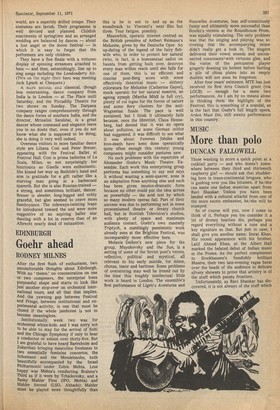EDINBURGH
Goehr ahead
RODNEY MILNES
After the first flush of enthusiasm, two uncomfortable thoughts about Edinburgh. With no 'theme,' no concentration on one or two composers, the enterprise loses Purposeful shape and starts to look like just another stop-over on orchestral international tours, and all that that implies. And the yawning gap between Festival and Fringe, between institutional and experimental activity, is one that must be closed if the whole jamboree is not to become meaningless. Institutionally, week two was for orchestral whizz-kids, and I was sorry not to be able to stay for the arrival of Solti and the Chicago Symphony if only to hear a conductor or soloist over thirty-five. But I am grateful to have heard Barenboim and Zukerman bringing masculine freshness to two essentially feminine concertos, the Schumann and the Mendelssohn, both beautifully accompanied by the Israel Philharmonic under Zubin Mehta. Less happy was Mehta's conducting Brahms's Third as if it were by Tchaikovsky, and a flashy Mahler First (IPO, Mehta) and Mahler Second (LSO, Abbado): Mahler must be played more thoughtfully than this is he is not to end up as the soundtrack to Visconti's next film but three. Tour fatigue, possibly.
Meanwhile, operatic interest centred on the British premiere of Aribert Reimann's Melusine, given by the Deutsche Oper. An up-dating of the legend of the fairy fishwife who, in order to protect her natural (who, in fact, is a homosexual sadist on haunts from getting built over, destroys every man within reach until she falls for one of them, this is an efficient and concise post-Berg score with some effectively theatrical music — slithery coloratura for Melusine (Catherine Gayer), mock operatic for her natural mentrix, an ageing nymph (Martha Midi in full cry), plenty of col legno for the forces of nature and some fiery clusters for the antiWagnerian finale. The pace is well sustained, but I think it ultimately fails because, once the librettist, Claus Henneberg, had denied that it was an opera about pollution, as some German critics had suggested, it was difficult to see what it was about. Femmes fatales and love-death have been done operatically quite often enough this century; young composers might consider pastures new.
No such problems with the repertoire of Alexander Goehr's Music Theatre Ensemble. Each work this enterprising group performs has something to say and says it without wasting a semi-quaver, none is an adaptation from anything else and each has been given musico-dramatic form because no other could put the idea across so powerfully — the acid test by which so many modern operas fail. Part of their success was due to performing not in some prosceniumed theatre or dreary church hall, but in Scottish Television's studios, with plenty of space and maximum audience contact. Goehr's own masterly Triptych, a numbingly pessimistic work already seen at the Brighton Festival, was incomparably more effective here.
Melanie Daiken's new piece for the group, Mayakovsky and the Sun, is a setting of some of the Soviet poet's verses, reflective, political and mystical, all relevant to his early suicide, for mime, chorus, tenor and baritone. Some problems of overscoring may well be ironed out by the time this toughly intellectual little work is heard in London. The ensemble's first performance of Ligeti's Aventures and Nouvelles Aventures, less self-consciously funny and ultimately more successful than Boulez's version at the Roundhouse Prom, was equally stimulating. The only problem was that the singing and playing was so riveting that the accompanying mime didn't really get a look in. The singers delivered their vowel sounds and unconnected consonants' with virtuoso glee, and the vision of the percussion player gingerly donning tin helmet before hurling a pile of china plates into an empty dustbin will not soon be forgotten.
After four years' existence, MTE has just received its first Arts Council grant (via LOCB) — enough for a mere two performances. As I am by no means alone in thinking them the highlight of the Festival, this is something of a scandal, as is the fact that Goehr's full length opera, Arden Must Die, still awaits performance in this country.










































 Previous page
Previous page